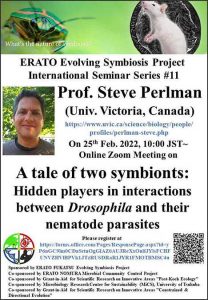第11回共生進化機構国際セミナー(共催)
2022年2月17日
ショウジョウバエの防衛共生細菌その他の多様な無脊椎動物の共生細菌に関する研究で知られるProf. Steve Perlman(University of Victoria, Canada)に講演いただきます。
参加希望者は以下より登録ください。必要情報をお知らせいたします。
https://www.jst.go.jp/erato/fukatsu/news/2022/220225.html
https://forms.office.com/Pages/ResponsePage.aspx?id=yP6nGC9lm0CDaSctnOgGIAZ0AUJReXxOnlfJYlsFCHFUNVZHVlBPVk1JTzRUSDRaR1JYR1FMOTBMSC4u&qrcode=true
Date: 25 February 2022 10:00 (JST)-
Platform: Zoom Meeting
Lecturer: Prof. Steve Perlman (University of Victoria, Canada)
Title: A tale of two symbionts: Hidden players in interactions between Drosophila and their nematode parasites
Abstract: Multicellular organisms commonly harbour microbes that protect them against natural enemies, and these defensive symbionts are important players in host-parasite evolution and ecology. On the other hand, natural enemies themselves may employ microbial symbionts that help them to successfully infect hosts; these types of symbioses have generally received less attention than defensive ones.
We have been studying how beneficial microbes affect interactions between Drosophila and their natural enemies. In particular, Drosophila are infected by diverse parasitic nematodes that vary widely in virulence and host specificity. We have found that D. neotestacea, a common N. American woodland species, harbours a maternally inherited bacterial symbiont called Spiroplasma that protects it against the virulent sterilizing nematode, Howardula aoronymphium, and that the benefit conferred by Spiroplasma is so great that symbiont-infected flies have replaced their uninfected counterparts across the continent. Protection appears to involve toxins called ribosome-inactivating proteins (RIPs). Spiroplasma genomes encode a diverse repertoire of RIP toxins, and we speculate that toxin diversity and evolution play an important role in specificity against different enemies. Finally, we have also recently found that Howardula nematodes have themselves recently acquired a bacterial symbiont that is allied with a lineage of plant-pathogenic bacteria, and we speculate on this symbiont’s role in infection and nematode fitness.
ERATO Evolving Symbiosis Project International Seminar Series #11
第11回ERATO共生進化機構国際セミナー
主催:ERATO深津共生進化機構プロジェクト
https://www.jst.go.jp/erato/fukatsu/
共催:ERATO野村集団微生物制御プロジェクト
https://www.jst.go.jp/erato/nomura/
共催:新学術領域研究「ポストコッホ生態」
https://postkoch.jp/
共催:筑波大学微生物サステイナビリティ研究センター(MiCS)
https://www.mics.tsukuba.ac.jp/
共催:新学術領域研究「進化制約方向性」
http://constrained-evo.org/
皆様の参加をお待ちしています。また、関心のありそうな方々への本アナウンスの周知を歓迎いたします。

